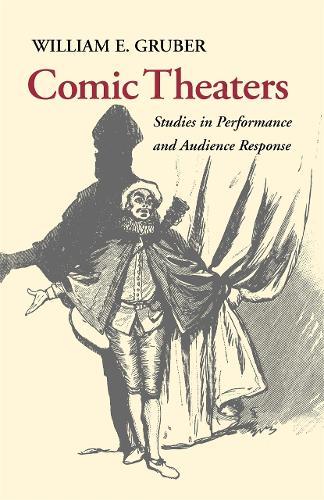Overview
In Comic Theaters, William E. Gruber draws dramatic criticism beyond its traditional emphasis on the play’s text toward a theory of theater that more fully incorporates performance. The bare text is clothed in the cultural norms and conceptions of both actor and audience in performance; in the conversion of words into action; in the actor’s creation of his role; and in the audience’s involvement with the scenes on stage. Reinterpreting six comedies taken from classical Greek, Renaissance, and modern repertories, Gruber shows how dramatic meaning is derived not from traditional criteria, archetypal motifs, or unchanging affective responses, but from changing concepts of theater and changing configurations of actor and role.
Full Product Details
Author: William E. Gruber
Publisher: University of Georgia Press
Imprint: University of Georgia Press
Dimensions:
Width: 14.00cm
, Height: 1.20cm
, Length: 21.60cm
Weight: 0.386kg
ISBN: 9780820338514
ISBN 10: 0820338516
Pages: 208
Publication Date: 01 May 2011
Audience:
Professional and scholarly
,
Professional & Vocational
Format: Paperback
Publisher's Status: Active
Availability: In Print

This item will be ordered in for you from one of our suppliers. Upon receipt, we will promptly dispatch it out to you. For in store availability, please contact us.
Language: English
Reviews
Thorough, well-reasoned, and consistently challenging. -- Choice There can be no doubt that Gruber has admirably, with restraint, modesty, and considerable analytical skill and theatrical sensitivity, proved his principal point: comedy is no monolith, and humor is no unchanging trait or reflection of some eternal human verity. -- Comparative Literature Thorough, well-reasoned, and consistently challenging. --Choice There can be no doubt that Gruber has admirably, with restraint, modesty, and considerable analytical skill and theatrical sensitivity, proved his principal point: comedy is no monolith, and humor is no unchanging trait or reflection of some eternal human verity. --Comparative Literature Thorough, well-reasoned, and consistently challenging.-- Choice There can be no doubt that Gruber has admirably, with restraint, modesty, and considerable analytical skill and theatrical sensitivity, proved his principal point: comedy is no monolith, and humor is no unchanging trait or reflection of some eternal human verity.-- Comparative Literature
There can be no doubt that Gruber has admirably, with restraint, modesty, and considerable analytical skill and theatrical sensitivity, proved his principal point: comedy is no monolith, and humor is no unchanging trait or reflection of some eternal human verity. |Thorough, well-reasoned, and consistently challenging.
There can be no doubt that Gruber has admirably, with restraint, modesty, and considerable analytical skill and theatrical sensitivity, proved his principal point: comedy is no monolith, and humor is no unchanging trait or reflection of some eternal human verity. -- Comparative Literature
Thorough, well-reasoned, and consistently challenging. --Choice There can be no doubt that Gruber has admirably, with restraint, modesty, and considerable analytical skill and theatrical sensitivity, proved his principal point: comedy is no monolith, and humor is no unchanging trait or reflection of some eternal human verity. --Comparative Literature
Author Information
WILLIAM E. GRUBER is a professor of English and adjunct professor of theater studies at Emory University. He is the author of Comic Theaters: Studies in Performance and Audience Response (Georgia), Offstage Space, Narrative, and the Theatre of the Imagination, and On All Sides Nowhere: Building a Life in Rural Idaho.



